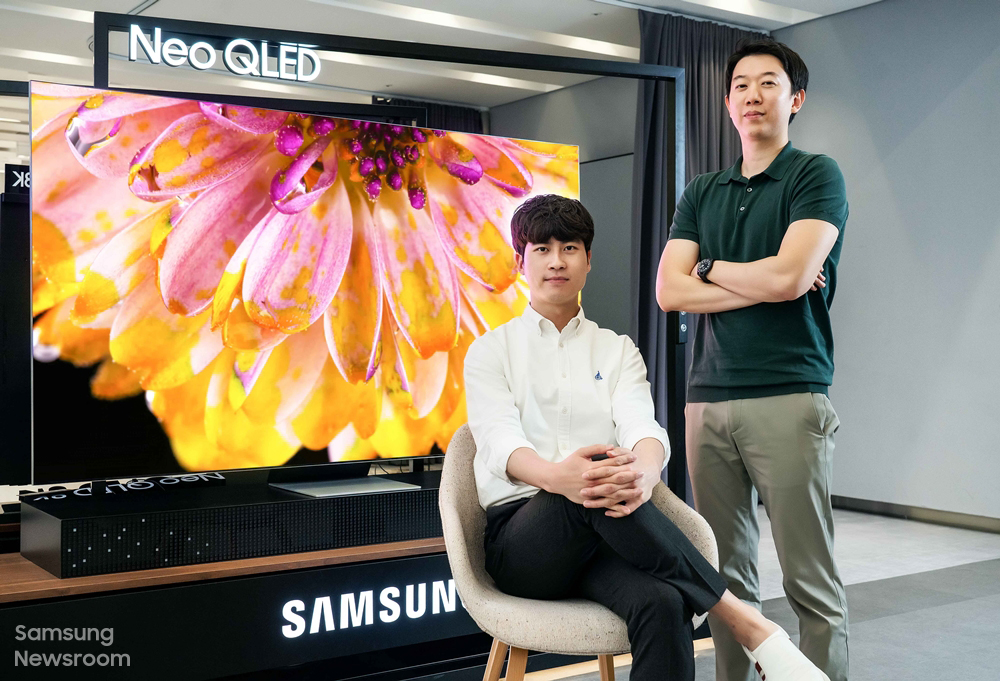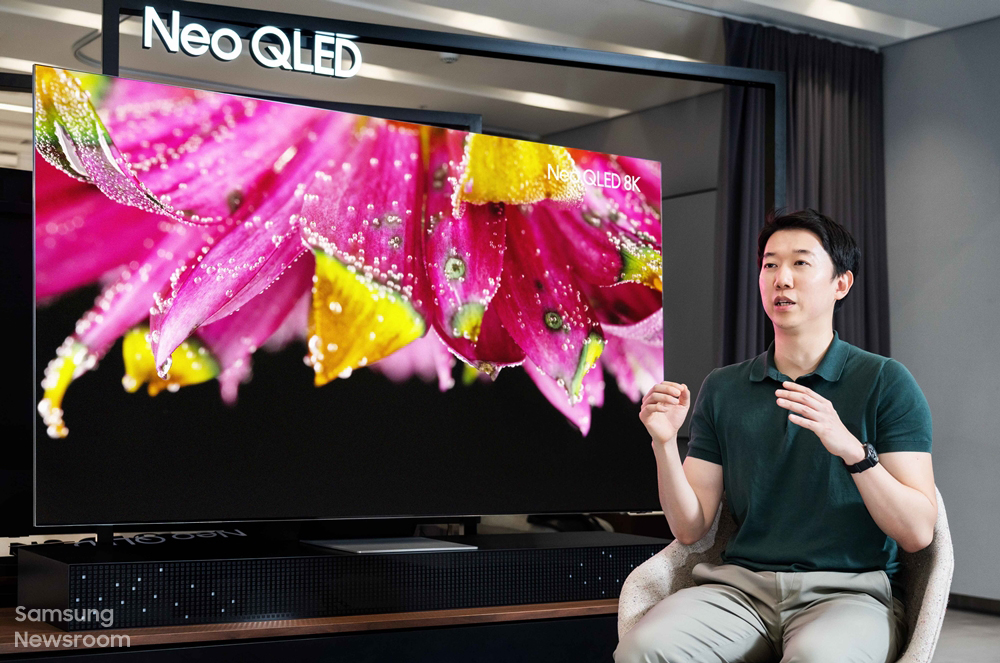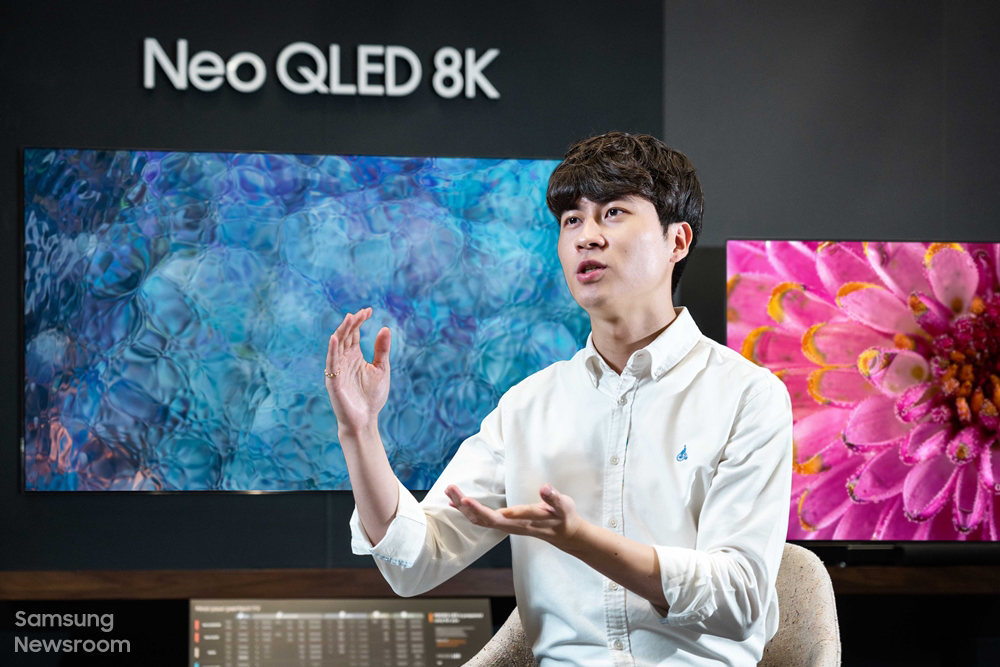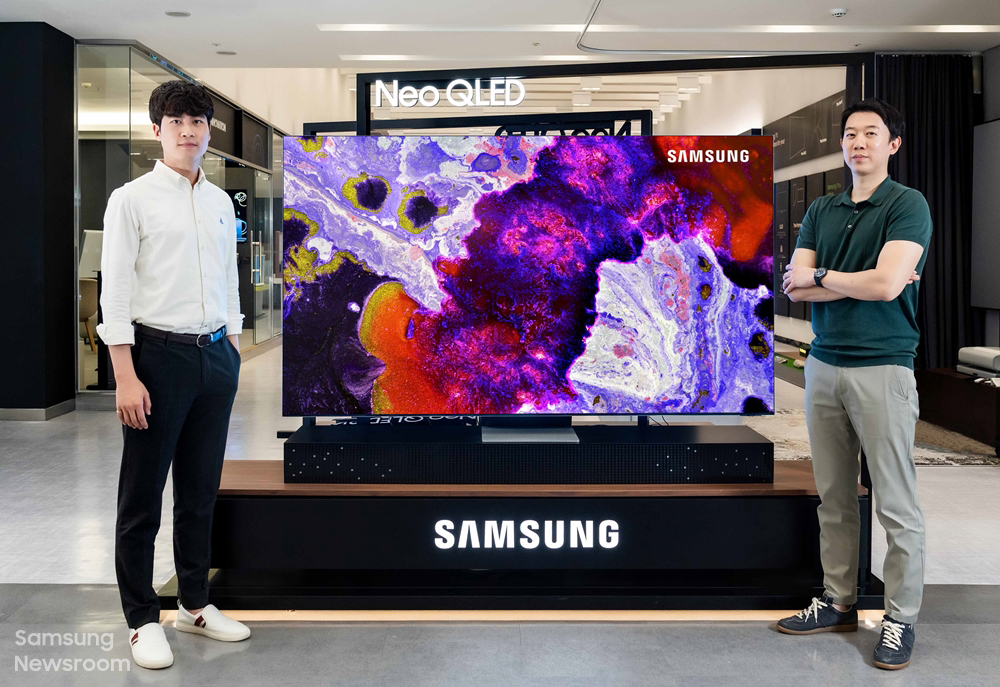
Source:Samsung
Every day, Samsung Electronics’ engineers and product planners work together to the end of creating products that are as fresh as they are innovative and groundbreaking. Their mission is no simple one: to introduce new ideas and advancements in technology while raising the bar, year after year.
Since the first introduction of the flagship QLED TV in 2017, Samsung’s product planners have been responsible for the introduction of countless innovations, ideas and partnerships with the goal of bringing users the tailored, true-to-life viewing experiences they expect.
As Samsung celebrates its 15th year as the number one global TV leader, no product better demonstrates cutting-edge product innovation of the company’s teams quite like the 2021 Neo QLED. In order to learn more about the development of the 2021 Neo QLED lineup, Samsung Global Newsroom sat down with two members of Samsung Visual Display’s TV Product Planning CX team, Taejin Hong and Woomin Lee.
Innovation That Understands the User
“Consumers expect new and exciting products every year, but there is a lot of competition out there,” noted Hong. “Many brands have TVs that are of the same size as Samsung’s, and also claim to have many of the same features and resolution, so central to our product development is breaking through the competition by really focusing on providing the most optimized user experiences for our Neo QLED lineup,” he added.
Central, then, to the teams’ QLED strategy direction is the user. “Recently, we have seen a dramatic shift in what consumers are looking and asking for,” highlighted Hong. “Users are moving away from specs and feeds to upgrades that are centered around personalized viewing experiences, design, and true-to-life picture quality.”
In order to realize this, both Hong and Lee stressed that timely feedback from real users as well as the market at large is critical. “It is so important for us to receive timely input and feedback from our customers, retailers, and behavioral experts in order for us to fully understand the most up-to-date TV trends,” noted Lee. “For our 2021 lineup, we focused on developing a new viewing experience that reflects the challenging and unprecedented times of late, one that is centered around hyper-personalized screens.”

Source:Samsung
Incorporating the New Normal Into TV Development
Not only has the recent global situation completely transformed the way users are interacting with their TVs, but it has also had an effect on the way TV product planning is carried out. “Traditionally, large trade shows such as CES and IFA serve as perfect opportunities for us to gather industry feedback, while in-person sales provide on-site consumer feedback,” explained Hong. “Since both of these opportunities have been off the table since early last year, we had to create a new internal meeting system that is both timely and agile enough to provide us with feedback from various regional offices regarding their local situations. This system incorporates touchpoints with vendors, partners, retailers, and customers, and allows us to easily communicate with all those on-site and helps us respond effectively to the changing landscape.”
Since its launch in 2017, the QLED lineup has taken the premium TV market by the storm. Last year, QLED sales reached 7.79 million units, accounting for 35.5% of total Samsung TV sales. The company’s 2021 Neo QLED lineup, recently launched across various regions throughout March and April, has also provided valuable insight for the planning teams. “In Korea alone, our Neo QLED TV sales have reached 20,000 units in under two months since product launch,” said Lee. “This speaks volumes to the importance of market research and timely consumer feedback.”
This new way of working, of course, comes with as many challenges as it does opportunities. “The number of meetings and calls we have held with regional product managers, retailers, and engineers around the world has more than doubled in the past year,” highlighted Hong. “Further to this, we have been actively carrying out surveys and research into our consumers and their ever-changing TV usage habits.” But this hard work has paid off, as noted by Hong: “The pandemic has been a challenge for all, but it has also provided us with a valuable opportunity to look back at what truly matters for both us and our users.”
Harnessing Teamwork to Adapt to the Latest Trends
There is no denying that mainstream consumer TVs are becoming larger in size and that the standards for picture quality are becoming higher than ever before. However, the recent shifts in TV and behavioral trends have seen Samsung’s product planners lean towards developing hyper-personalized screens able to fit into individual consumer lifestyles.
“The past few years have been a period of introspection for a lot of people and self-improvement has become the force driving many purchases around the world,” said Lee. “According to a Salesforce report, 5 out of 10 consumers responded that they would consider swapping out a product for a different brand if it doesn’t deliver a truly personalized experience.”
But this change in behavioral trends has not resulted in a complete transformation of the team’s strategy planning. “Picture quality and design have been our top priorities since the launch of our first TV, and changing consumer usage patterns, along with the increased need to provide a one-of-a-kind experience, are what ultimately led to the creation of this year’s Neo QLED lineup,” explained Lee.
Samsung’s Neo QLED 43-inch model was also created through this multifaceted way of thinking. “Initially, we had not considered developing any sizes below 55 inches for the QLED lineup given the industry trend that saw consumers embracing larger screen models,” noted Hong. “However, following a study we undertook, we learned that there is also a growing demand for ‘second’ screens and more personalized screens used within office settings as well as family and gaming settings.”
According to the study undertaken by Samsung, the advent of the ‘new normal’ that has seen consumers spending more and more time at home has seemed to accelerate different consumer TV use cases and there has been an uptick in interest in smaller screens. “We have seen an increased demand for smaller and medium-sized screens,” said Lee. “But when it comes to developing these smaller TVs, it is not just a question of simply shrinking the size. Every piece of engineering must be adjusted for a differently-shaped model, and everything from the supply chain to the production line must be customized for each product.” In the end, teamwork brought it all together: “We quickly got together with the engineering team and started developing the smaller flagship models for release this year – teamwork at its finest!”

Source:Samsung
Developing Neo QLED to Be the Ultimate Entertainment Hub
“Another exciting trend we have noticed since the beginning of 2020 is that a lot of people are playing more games, be it on their mobile, computer or on their TV,” noted Hong. According to a recent report from the Entertainment Software Association (ESA), there are approximately 214 million gamers in the U.S. alone, with 75% of households having at least one member actively playing games on a regular basis.
“Gaming has become a fun group activity during the pandemic, particularly for those looking to connect with others,” highlighted Hong. “Naturally, we incorporated this trend into our latest products to provide a one-of-a-kind gaming experience. Such dedicated features on the 2021 Neo QLED include Super Ultra-wide Game View and the all-new Game Bar gaming interface – all while maintaining one of the lowest input lags in each TV category.”
Hong, in particular, is a fan of these game-centric additions to the QLED lineup. “Personally, I enjoy the Super Ultra-wide Game View feature, which enables gamers to experience ultra-wide gaming. It is a feature completely new to TVs with its 21:9 and 32:9 aspect ratios, and this expanded field of view is great for finding hidden items or discovering enemies lurking in the corner while gaming.”
Maintaining the Samsung Legacy of Superior Picture Quality and Design
Both Hong and Lee agree that the latest Neo QLED lineup would be nothing without the past 15 years of display innovation. “At the end of the day, the QLED’s new features and product differentiation strategy wouldn’t lead to much without our solid foundation in picture quality and design,” highlighted Hong.
Lee, who has led QLED usage studies in global markets, agreed that this was a universal trend that continues to guide consumer choice. “The Neo QLED lineup is a product that reflects a meticulous study of user behaviors and priorities,” he noted. “We realize that there are many factors to consider when looking to purchase a new TV, but at the end of the day, it is the superb image quality and sleek design offered by Samsung TVs that provide the most satisfaction to our customers.”
The Neo QLED line represents the very latest iteration of this foundational excellence. “In particular, our Neo QLED TVs are equipped with Quantum Matrix Technology and Neo Quantum Processors, which enhance the picture quality through cutting-edge upscaling technology that harness Quantum Mini LEDs that are 1/40 the size of conventional LEDs,” explained Lee. “These technologies are a culmination of the industry’s peak technological advancements all working together to bring unrivaled picture quality to users in any viewing environment.”
The innovative Quantum Mini LEDs featured in the 2021 Neo QLED lineup in fact played a very important role in design upgrades. “It is only fitting that, with such stunning picture quality and immersive audio experiences, we would also look to enhance the TV’s design,” explained Hong. “Due to the size of the Quantum Mini LEDs, we were able to modify the TV’s form factor to possess a slim and minimalistic design. It is a modern accent piece suited for any interior, all thanks to Samsung’s engineering mastery.”
Looking to 2022 – and Beyond
“I think the fact that we have been able to win over consumers for the past 15 years is a testament to Samsung’s dedication and commitment to developing products that are in line with consumers’ needs,” noted Lee. “In particular, ever since the introduction of our QLED lineup in 2017, we have seen a rapid increase in market share in the premium TV segment, which we are very proud of.”

Source:Samsung
Based on the success of Neo QLED, Samsung’s TV product planning team is in the midst of developing yet another impressive and groundbreaking product lineup for 2022. “There is truly never a dull moment during the development cycle,” noted Lee. “We are already very excited for our 2022 lineup, and we hope that it will see us extend our No. 1 title in the global TV market through 2022 for a 16-year streak.”















